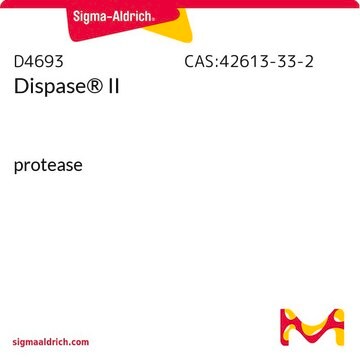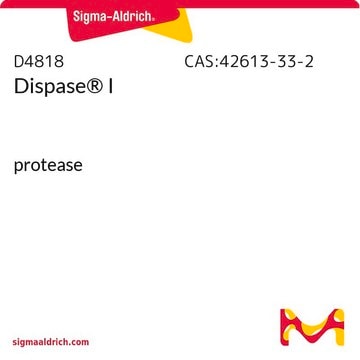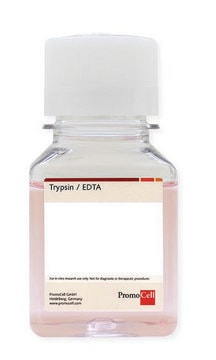04942086001
Roche
Dispase® I (neutral protease, grade I)
lyophilized, ≥10 units/mg protein (20 U/vial (37 °C, casein as substrate, pH 7.5)), optimum pH 6.0-8.5
About This Item
Productos recomendados
biological source
Bacillus polymyxa
Quality Level
form
lyophilized
specific activity
≥10 units/mg protein (20 U/vial (37 °C, casein as substrate, pH 7.5))
packaging
pkg of 10 × ~2 mg
manufacturer/tradename
Roche
concentration
0.6-2.4 U/mL
technique(s)
tissue processing: suitable
color
white
optimum pH
6.0-8.5
solubility
water: soluble
application(s)
life science and biopharma
sample preparation
shipped in
wet ice
storage temp.
2-8°C
General description
Specificity
Application
Features and Benefits
- Rapid, effective, yet gentle agent that liberates intact cells
- Maintains cell membrane integrity
- Non-mammalian source - free of mycoplasma and animal virus contamination
- Extremely stable to influences of temperature, pH, and interference by serum components
- Easily inactivated by chelating agents or by dilution
- Delivers higher activity and convenience
Contents
10 vials with approximately 2mg each (= 20U/vial).
Specifications
Inhibitors: EDTA, EGTA, Hg2+, other heavy metals. Dispase is not inhibited by serum.
Unit Definition
A practical comparison of RAS units of Dispase® with those cited in the Japanese literature (where concentrations of 1,000 to 2,000 Dispase® units /ml are not uncommon) suggests one Roche Applied Science unit of Dispase® I equals approximately 416 Japanese units of Dispase®.
One unit of Roche Applied Science Dispase® equals 181 protease units (PU) measured as release of amino acids equivalent to 1 μg tyrosine per min and ml at pH 7.5 and +37 °C.
Physical form
Preparation Note
Working concentration: 0.6 to 2.4 U/ml
Working solution: Preparation of stock and working solutions:
To produce a 10 mg/ml stock solution, dissolve the lyophilized Dispase® I enzyme in HEPES-buffered saline (50 mM HEPES/KOH pH 7.4, 150 mM NaCl). To produce the working solution, dilute the above stock solution with the culture medium for the isolated cells, at a final concentration of 0.6 to 2.4 U/ml. Note that concentrations higher than 2.4 U/ml are not recommended. For best results, filter the working solution using a 0.22 μm filter membrane.
Storage conditions (working solution): -15 to -25 °C
The reconstituted stock solution is stable at 2 to 8 °C for 2 weeks. For storage up to 2 months, the stock solution should be frozen in aliquots. Avoid repeated freezing and thawing.
The working solution diluted with PBS is stable at 2 to 8 °C for 3 days.
Storage and Stability
Other Notes
Legal Information
signalword
Danger
Hazard Classifications
Eye Irrit. 2 - Resp. Sens. 1 - Skin Irrit. 2 - STOT SE 3
target_organs
Respiratory system
Storage Class
11 - Combustible Solids
wgk_germany
WGK 1
flash_point_f
does not flash
flash_point_c
does not flash
Certificados de análisis (COA)
Busque Certificados de análisis (COA) introduciendo el número de lote del producto. Los números de lote se encuentran en la etiqueta del producto después de las palabras «Lot» o «Batch»
¿Ya tiene este producto?
Encuentre la documentación para los productos que ha comprado recientemente en la Biblioteca de documentos.
Los clientes también vieron
Contenido relacionado
Collagenase Guide.Collagenases, enzymes that break down the native collagen that holds animal tissues together, are made by a variety of microorganisms and by many different animal cells.
Collagenase Guide.Collagenases, enzymes that break down the native collagen that holds animal tissues together, are made by a variety of microorganisms and by many different animal cells.
Collagenase Guide.Collagenases, enzymes that break down the native collagen that holds animal tissues together, are made by a variety of microorganisms and by many different animal cells.
Collagenase Guide.Collagenases, enzymes that break down the native collagen that holds animal tissues together, are made by a variety of microorganisms and by many different animal cells.
Nuestro equipo de científicos tiene experiencia en todas las áreas de investigación: Ciencias de la vida, Ciencia de los materiales, Síntesis química, Cromatografía, Analítica y muchas otras.
Póngase en contacto con el Servicio técnico
















